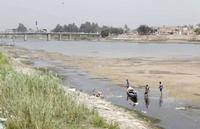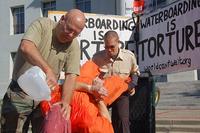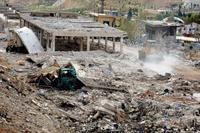-
Senate expects to extend terrorism insurance after House passes bill
After the House passed the Terrorism Risk Insurance Program Reauthorization Act of 2014 (TRIPRA) last week, supporters of the bill expect the Senate to approve it, although they are unsure when that will occur. The current version of the program is expected to expire by 31 December unless Congress renews the legislation or places a temporary extension.The House version would extend TRIPRA for six years, increase the threshold for government reimbursement from $100 million to $200 million, and increase companies’ co-payments to 20 percent from 15 percent.
-
-
Congressional funding allows partial roll-out of Calif. seismic early warning system
California officials applauded the U.S. Senate approval of the $1.1-trillion spending package, which allocated $5 million to fund expansion of the state’s earthquake early-warning system dubbed ShakeAlert.In 2015, a select number of schools will receive earthquake alerts to warn students and teachers to drop and cover before shaking begins, fire stations will be alerted to open their garage doors before electricity goes out and prevents doors from opening, and some hospitals will receive notice to suspend surgeries.
-
-
Cyber whodunnit: North Korea prime suspect but there are many potential culprits
Many suspect North Korea to be behind the attack on Sony Pictures. North Korea quite possibly has motive, means, and opportunity to carry out this attack on Sony, but as with any successful prosecution, that isn’t enough. We need evidence. We will have to wait for the detailed forensic work to complete before we stand a realistic chance of knowing for certain. That may or may not be forthcoming, but in the meantime we should consider what this event tells us about the balance of power in cyberspace. In a world in which major disruption can be caused with scant resources and little skill, all enemies are a threat. North Korea might be the rogue state that everyone loves to hate but there are plenty of others who could have done it. There is no longer a tiered approach of superpowers fighting proxy wars in smaller, developing nations. Now those developing nations can fight back, and you might not even know it was them.
-
-
Analyzing how emotions ripple following terrorist events
The 2013 Boston Marathon bombing motivated mass expressions of fear, solidarity, and sympathy toward Bostonians on social media networks around the world. In a recently released study, researchers analyzed emotional reactions on Twitter in the hours and weeks following the attack. The study is the first large-scale analysis of fear and social-support reactions from geographically distant communities following a terrorist attack. The full results of the study may provide insight to governmental agencies exploring how best to handle public fear following a disruptive event.
-
-
Power grids in coastal U.S. cities increasingly vulnerable as a result of climate change
Cities such as Miami are all too familiar with hurricane-related power outages. A new analysis finds, however, that climate change will give other major metropolitan areas a lot to worry about in the future. Johns Hopkins University engineers created a computer model to predict the increasing vulnerability of power grids in major coastal cities during hurricanes. By factoring historic hurricane information with plausible scenarios for future storm behavior, the team determined which of twenty-seven cities, from Texas to Maine, will become more susceptible to blackouts from future hurricanes. The team’s analysis could help metropolitan areas better plan for climate change.
-
-
House approves 4-year extension of chemical facility safety legislation
On 11 December the House approved a 4-year reauthorization of DHS’s Chemical Facility Anti-Terrorism Standardsprogram (CFATS), meant to protect U.S. chemical facilities from terrorist attacks. President Barack Obama is expected to sign the bill(H.R. 4007). Implementing the CFATS program will cost roughly $349 million over fiscal years 2015 to 2019. The CFATS, authorized in Section 550 of the 2007 DHS Appropriations Act, requires industrial facilities with certain levels of use or storage of chemicals to submit information about their chemical holdings to DHS, assess their vulnerabilities, and submit plans to address those vulnerabilities and secure their chemical holdings.
-
-
Can a hacker stop your car or your heart? Security and the Internet of Things
An ever-increasing number of our consumer electronics is Internet-connected. We’re living at the dawn of the age of the Internet of Things. Appliances ranging from light switches and door locks, to cars and medical devices boast connectivity in addition to basic functionality. The convenience can’t be beat, but the security and privacy implications cannot and should not be ignored. There needs to be a concerted effort to improve security of future devices. Researchers, manufacturers and end users need to be aware that privacy, health and safety can be compromised by increased connectivity. Benefits in convenience must be balanced with security and privacy costs as the Internet of Things continues to infiltrate our personal spaces.
-
-
ISIS uses control of water as a tool of war

Global security analysts have warned for some time now that water scarcity due to climate change will be used as a tool of war in regions with poor governance.The on-going wars in Iraq and Syria provide the first examples of the strategic and tactical use of water as a tool of war, as militant groups operating in both countries have been using water against residents of areas they control. “ISIS has established a blueprint that can be used by other entities to take advantage of drought and water scarcity,” writes one researcher. “For all the conversation about ISIS taking control of oil refineries, one could argue that their control of water is even more significant, as it deprives the population of a resource necessary for daily sustenance and gives the militant group significant leverage over local governments and populations.”
-
-
Michigan teen-ager faces terrorism charges after posting anonymous threats
A 17-year-old Brandon High School student in Oakland County, Michigan has been arrested and accused of posting online threats using the anonymous app, After School. The Oakland County Sheriff’s office contacted the app provider and served subpoenas to identify the anonymous user who posted seventeen messages and five pictures, ranging from “Tomorrow I am going to shoot and kill every last one of you and it’s going to be bigger than Columbine,” “Death to you all,” and “Bang Bang Brandon Bang Bang,” to stock photos of a person holding a pump-action shotgun.As of Thursday evening, Apple has pulled the After School app from its App Store.
-
-
More than 5,000 killed in Jihadist violence in November
Jihadist groups killed more than 5,000 people in November, with Iraq topping the death league table, followed by Nigeria, Afghanistan, and Syria. In 664 incidents recorded in November by the BBC World Service and researched jointly with the International Center for the Study of Radicalization and Political Violence at King’s College London, the overall death toll was 5,042, or an average of 168 deaths per day. After Iraq, Nigeria, Afghanistan, and Syria, Yemen was fifth in the number of deaths, tying with Somalia, with 37 incidents each.
-
-
FAA would allow four private companies to operate drones in U.S. airspace
The Federal Aviation Administration(FAA) announced the other day that it would allow four private companies to operate drones in U.S. airspace. The drones will be used to survey land, inspect remote oil rigs, perform agricultural and environmental research, monitor construction projects, and collect geographical data. The FAA has banned most drone flights as they pose a risk to the safety of manned aircrafts, and in some cases to privacy. The drone industry says that if drones are integrated into U.S. civilian airspace, the domestic economic impact would surpass $82.1 billion between 2015 and 2025, while creating more than 100,000 high-paying jobs.
-
-
Report details brutal interrogation practices, lax supervision

The long-awaited report on the CIA interrogation practices was release yesterday, causing a political storm. Many congressional Republicans have expressed concern over the release of the Senate report on the CIA’s use of torture on captured al-Qaeda and Islamist militants, claiming it would set off a global backlash, and threaten the security of American troops and diplomatic missions overseas.Obama administration officials agree that the release of the Senate report or its declassified executive summary is a good reason for concern about the security of U.S. facilities and military bases overseas, but they doubt it would lead to the sort of violence that killed four Americans at a diplomatic outpost in Benghazi, Libya in 2012.
-
-
Texas Ebola task force calls for revamping state’s preparations for epidemics
The Texas Task Force on Infectious Disease Preparedness and Responsehas called for the establishment of two specialized Ebola treatment centers in Texas, and for new methods to monitor vulnerable health care workers, especially those returning from West Africa.The state acknowledges that it alone is unable to handle an infectious disease outbreak like Ebola. The task force wants federal health and disease authorities to provide actionable information during disease outbreaks.
-
-
Israel attacks targets in Syria to prevent advanced arms shipments to Hezbollah

Israeli jets bombed two military targets in Syria – one near the Damascus International Airport, the other near the town of Dima, north of Damascus and near the Syria-Lebanon border – and as has been the case in previous such attacks, there was no confirmation or elaboration from Jerusalem. Syrian general command sources said that several facilities had been hit, both at the Damascus International Airport and in the area of Dimas. This is the tenth Israeli attack against military depots in Syria since January 2013. The attacks have had a specific goal: to prevent the Assad regime and Iran from transferring advanced weapon systems to Hezbollah. When Israel’s intelligence services notice that such systems are gathered for the purpose of shipping them to Hezbollah, the shipments are destroyed before they are delivered to Hezbollah.
-
-
U.S. concerns grow as ISIS establishes a base of operations in Libya
Last week the Pentagon publicly expressed its concerns about the fact the ISIS has established a base of operation in Libya. The commander of the U.S. army’s Africa Command told reporters that ISIL (ISIS) is now running training camps in the town of Derna, 450 miles east of Tripoli, where as many as 200 local fighters are receiving instruction. “ISIL has begun its efforts over in the east out there,” said General David Rodriguez. “It’s mainly about people coming for training and logistics support right now.”
-
More headlines
The long view
Factories First: Winning the Drone War Before It Starts
Wars are won by factories before they are won on the battlefield,Martin C. Feldmann writes, noting that the United States lacks the manufacturing depth for the coming drone age. Rectifying this situation “will take far more than procurement tweaks,” Feldmann writes. “It demands a national-level, wartime-scale industrial mobilization.”
No Nation Is an Island: The Dangers of Modern U.S. Isolationism
The resurgence of isolationist sentiment in American politics is understandable but misguided. While the desire to refocus on domestic renewal is justified, retreating from the world will not bring the security, prosperity, or sovereignty that its proponents promise. On the contrary, it invites instability, diminishes U.S. influence, and erodes the democratic order the U.S. helped forge.
Fragmented by Design: USAID’s Dismantling and the Future of American Foreign Aid
The Trump administration launched an aggressive restructuring of U.S. foreign aid, effectively dismantling the United States Agency for International Development (USAID). The humanitarian and geopolitical fallout of the demise of USAID includes shuttered clinics, destroyed food aid, and China’s growing influence in the global south. This new era of American soft power will determine how, and whether, the U.S. continues to lead in global development.
Water Wars: A Historic Agreement Between Mexico and US Is Ramping Up Border Tension
As climate change drives rising temperatures and changes in rainfall, Mexico and the US are in the middle of a conflict over water, putting an additional strain on their relationship. Partly due to constant droughts, Mexico has struggled to maintain its water deliveries for much of the last 25 years, deliveries to which it is obligated by a 1944 water-sharing agreement between the two countries.
How Disastrous Was the Trump-Putin Meeting?
In Alaska, Trump got played by Putin. Therefore, Steven Pifer writes, the European leaders and Zelensky have to “diplomatically offer suggestions to walk Trump back from a position that he does not appear to understand would be bad for Ukraine, bad for Europe, and bad for American interests. And they have to do so without setting off an explosion that could disrupt U.S.-Ukrainian and U.S.-European relations—all to the delight of Putin and the Kremlin.”
How Male Grievance Fuels Radicalization and Extremist Violence
Social extremism is evolving in reach and form. While traditional racial supremacy ideologies remain, contemporary movements are now often fueled by something more personal and emotionally resonant: male grievance.
